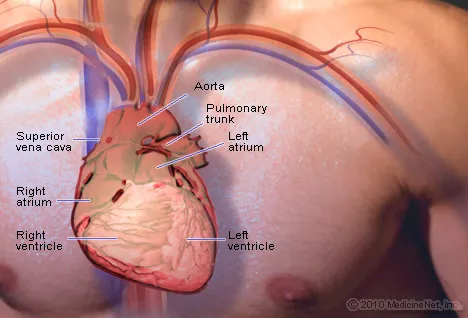Latest Mental Health News

MONDAY, June 21, 2021 (American Heart Association News)
A type of psychotherapy that changes how people regulate thinking patterns may reduce anxiety and depression for people recovering from heart problems, new research shows.
The study, published Monday in the American Heart Association journal Circulation, found 1 in 3 people who took part in metacognitive therapy, or MCT, during cardiac rehabilitation significantly reduced their symptoms compared to those who did not receive therapy.
Roughly one-third of people with heart disease suffer from anxiety and depression, which have been associated with the progression of heart disease and other heart-related complications. Studies show people who experience poor mental health following heart problems have a harder time recovering and a poorer quality of life than those who don't.
"This could make a big difference to patients' lives and health in the long-term," said lead study author Adrian Wells, professor of clinical and experimental psychopathology at the University of Manchester in England. Wells is the originator and developer of MCT, which aims to lower anxiety and depression by helping people regulate unhelpful thinking processes of worry and rumination. He also is founder and director of the MCT Institute in Manchester and director of the Anxiety, Depression and Psychological Therapies Research Unit at Greater Manchester Mental Health NHS Foundation Trust.
Previous studies show cognitive behavioral therapy, or CBT, a more traditional type of psychotherapy, also can reduce anxiety and depression symptoms for people with heart disease. CBT helps people challenge the content of their negative thoughts, whereas MCT helps them reduce the amount of time they spend absorbed in negative thinking, Wells said.
In the new study, researchers compared symptoms of anxiety and depression between two groups of heart patients enrolled in cardiac rehabilitation programs at five hospitals in England. Both groups received routine cardiac rehab services that included exercise, health education and stress management. But one group also received six sessions of group metacognitive therapy. Both groups were followed for one year.
After four months, those given MCT achieved significantly lower scores for depression and anxiety compared to those who did not receive therapy. The improvements in anxiety and depression were sustained for up to a year.
Wells said he was surprised to see such strong results since the therapy was not delivered by professional psychotherapists. The MCT groups were run by cardiac rehabilitation staff who were trained to deliver the metacognitive therapy during a two-day workshop followed by supervised practice in a pilot group.
This study suggests MCT may be a promising alternative treatment to CBT, said Dr. Christopher Celano, associate director of the cardiac psychiatry research program at Massachusetts General Hospital in Boston.
"Though research to confirm these findings is needed, this study's results are quite promising, as MCT's effects were comparable to or larger than what has been seen with CBT in this population. Furthermore, the improvements in depression and anxiety were maintained after one year, suggesting MCT can have lasting effects on mental health," said Celano, also an assistant professor in psychiatry at Harvard Medical School. He was not involved in the study.
The important thing about the findings, Celano said, is they show psychotherapy can play an important role for people recovering from heart attacks and other heart-related problems.
"Depression and anxiety can make it very difficult for individuals with heart disease to engage in activities that promote heart health, like physical activity or a healthy diet," he said. While cardiac rehabilitation helps people improve lifestyle behaviors, "adding a mental health component takes a more holistic view of recovery."

IMAGES
Heart Illustration Browse through our medical image collection to see illustrations of human anatomy and physiology See Images"Given that mental health and heart health are closely linked," Celano said, "I wouldn't be surprised if improving mental health leads to cardiovascular benefits down the road as well."
American Heart Association News covers heart and brain health. Not all views expressed in this story reflect the official position of the American Heart Association. Copyright is owned or held by the American Heart Association, Inc., and all rights are reserved. If you have questions or comments about this story, please email [email protected].
By Laura Williamson
American Heart Association News

Copyright © 2021 HealthDay. All rights reserved.
From


Healthy Heart Resources
Featured Centers
Health Solutions From Our Sponsors
Continue reading...
